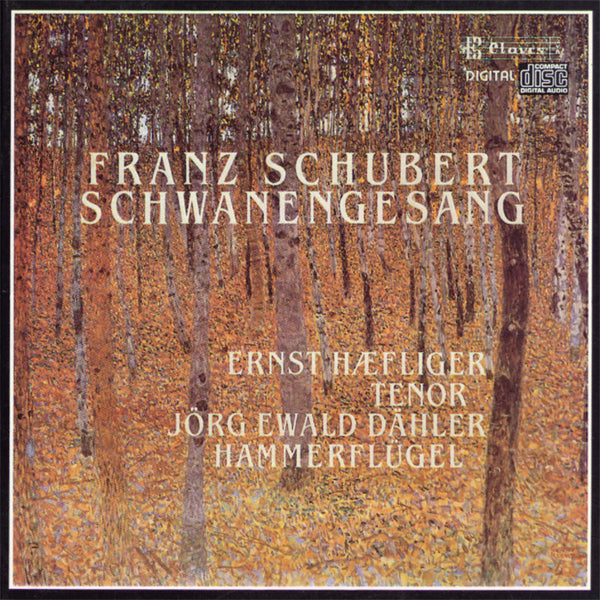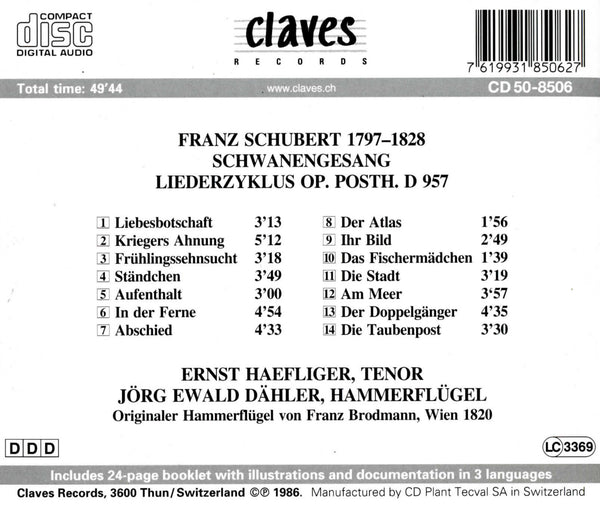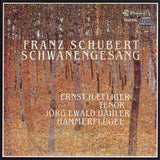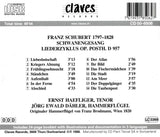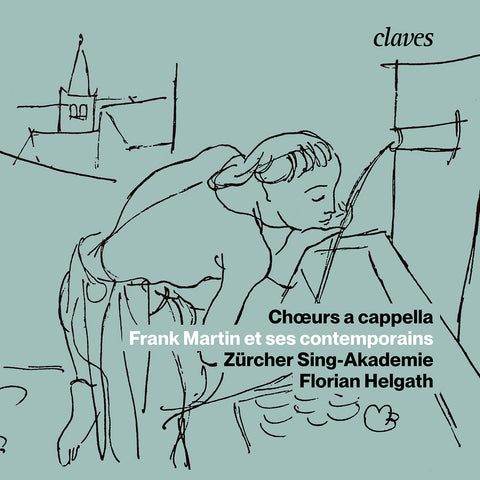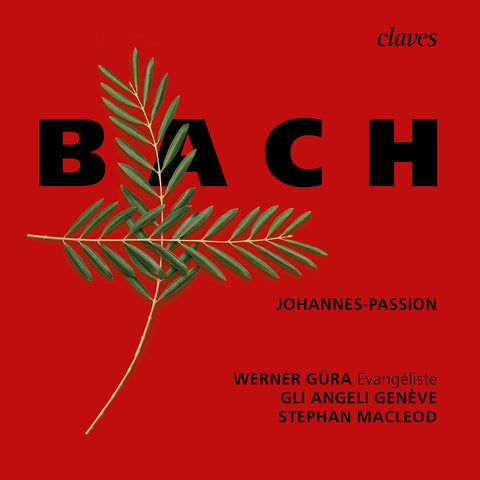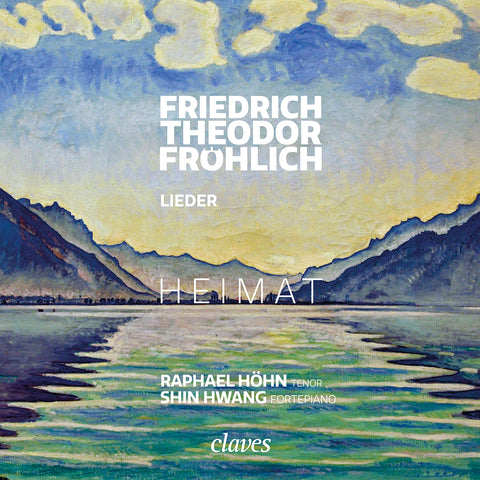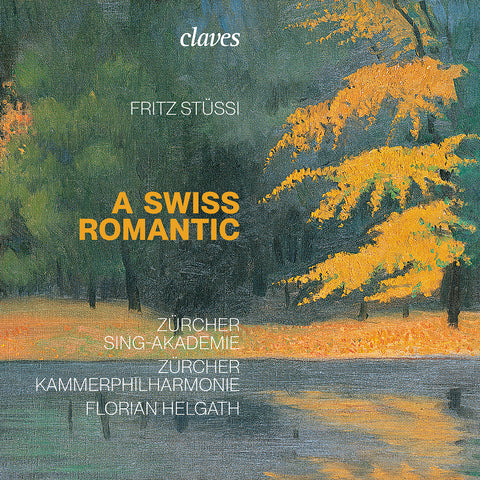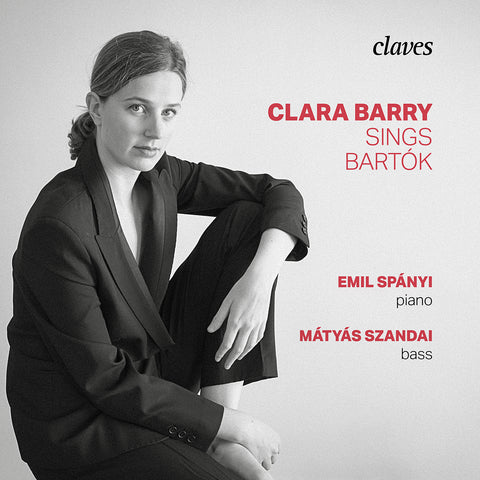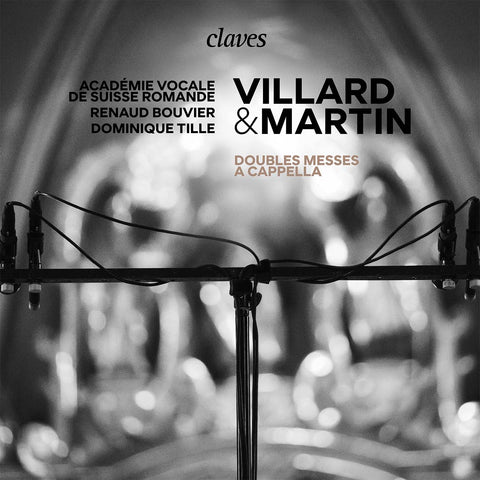(1986) Franz Schubert/ Schwanengesang
Catégorie(s): Chant lyrique
Instrument(s):
Voix: Ténor
Compositeur principal: Franz Schubert
Nb CD(s): 1
N° de catalogue:
CD 8506
Sortie: 1986
EAN/UPC: 7619931850627
- UPC: 829410479462
Cet album est en repressage. Précommandez-le dès maintenant à un prix spécial.
CHF 18.50
Cet album n'est plus disponible en CD.
Cet album n'est pas encore sorti. Précommandez-le dès maintenant.
CHF 18.50
Cet album n'est plus disponible en CD.
Cet album n'est plus disponible en CD.
TVA incluse pour la Suisse et l'UE
Frais de port offerts
Cet album est en repressage. Précommandez-le dès maintenant à un prix spécial.
CHF 18.50
Cet album n'est plus disponible en CD.
This album has not been released yet.
Pre-order it at a special price now.
CHF 18.50
Cet album n'est plus disponible en CD.
Cet album n'est plus disponible en CD.
FRANZ SCHUBERT/ SCHWANENGESANG
Ernst Haefliger – born in Switzerland – belongs to the few great singers of our day who represent the culture of a “lyric” tenor. His mastership, now lasting nearly half a century, has brought about a stability which is rare. Haefliger’s high standard is guaranteed by connecting natural technical perfection with extreme artistic intelligence that never overrates the possibilities of a voice.
As a professor at the Musikhochschule in Munich and in numerable master classes all over the world Haefliger passes this quality on to his students. His own musical education began at the Conservatory of Zurich; later he studied with Julius Patzak in Munich, who enabled him to follow in the tradition of the real “lyric” singers.
Then, in Prague and Geneva studies followed with Carpi. In 1943 Volkmar Andreae engaged the young Haefliger for Bach’s St. John's Passion on Good Friday in Zurich. This was the “birth” of the evangelist Haefliger, whose interpretation of all evangelist parts still stands as an ideal.
Haefliger's career as an opera singer led him to all the music centres of the world, to the international festivals. He became “Kammersänger” at the “Deutsche Oper Berlin”, where over many years he incorporated the ideal of a Mozart tenor. His repertory has always been extensive, always courageous, but never daring. Never, since Patzak, could an interpretation of the tenor part of Mahler’s “Lied von der Erde” become so exemplary as Haefliger's; it may in fact be called a worldwide success, as had been his evangelist and Mozart roles.
Here Haefliger has set standards. Beside his career in opera and the oratorio Haefliger has always devoted himself to the “Lied”. It is a lucky chance that the mature artist now is able to concentrate on it my means of recording. Haefliger knows that experiment and experience are the components which lead to those ideals Haefliger, like few other artists of our day, was able to fulfil. The Schubert cycles may be the best proof of it.
Jörg Ewald Dähler was born in Berne. During the last decade he not only attracted attention as a harpsichord player (he studied with Fritz Neumeyer), but also through the unspectacular way of finding a new approach to interpretation by means of a critical understanding of music history.
His interpretations of classical masterpieces – particularly in the case of Schubert – on original instruments, without any historizing attitudes and without exaggerating his stylistic ideologies, attracted attention. Working with Ernst Haefliger on the Schubert songs, he created so called models.
Dähler is professor for harpsichord, basso continuo and chamber music at the Conservatory of Berne; as conductor of the “Berner Kammerchor” he endeavors to find and perform unknown masterpieces. The remarkable rediscovery of Zelenka’s oratories, which are recorded by Claves, is one of his merits in this field.
Dähler's art is based on a thorough knowledge of the subject, a knowledge founded on theory as well as on experience. He performs as a soloist, he accompanies, he conducts and plays chamber music, and in each of these different functions he excels: being discrete, obliged to detail, conscious of the historical reality of the work, giving it nevertheless a new interpretation.
(1986) Franz Schubert/ Schwanengesang - CD 8506
Ernst Haefliger – born in Switzerland – belongs to the few great singers of our day who represent the culture of a “lyric” tenor. His mastership, now lasting nearly half a century, has brought about a stability which is rare. Haefliger’s high standard is guaranteed by connecting natural technical perfection with extreme artistic intelligence that never overrates the possibilities of a voice.
As a professor at the Musikhochschule in Munich and in numerable master classes all over the world Haefliger passes this quality on to his students. His own musical education began at the Conservatory of Zurich; later he studied with Julius Patzak in Munich, who enabled him to follow in the tradition of the real “lyric” singers.
Then, in Prague and Geneva studies followed with Carpi. In 1943 Volkmar Andreae engaged the young Haefliger for Bach’s St. John's Passion on Good Friday in Zurich. This was the “birth” of the evangelist Haefliger, whose interpretation of all evangelist parts still stands as an ideal.
Haefliger's career as an opera singer led him to all the music centres of the world, to the international festivals. He became “Kammersänger” at the “Deutsche Oper Berlin”, where over many years he incorporated the ideal of a Mozart tenor. His repertory has always been extensive, always courageous, but never daring. Never, since Patzak, could an interpretation of the tenor part of Mahler’s “Lied von der Erde” become so exemplary as Haefliger's; it may in fact be called a worldwide success, as had been his evangelist and Mozart roles.
Here Haefliger has set standards. Beside his career in opera and the oratorio Haefliger has always devoted himself to the “Lied”. It is a lucky chance that the mature artist now is able to concentrate on it my means of recording. Haefliger knows that experiment and experience are the components which lead to those ideals Haefliger, like few other artists of our day, was able to fulfil. The Schubert cycles may be the best proof of it.
Jörg Ewald Dähler was born in Berne. During the last decade he not only attracted attention as a harpsichord player (he studied with Fritz Neumeyer), but also through the unspectacular way of finding a new approach to interpretation by means of a critical understanding of music history.
His interpretations of classical masterpieces – particularly in the case of Schubert – on original instruments, without any historizing attitudes and without exaggerating his stylistic ideologies, attracted attention. Working with Ernst Haefliger on the Schubert songs, he created so called models.
Dähler is professor for harpsichord, basso continuo and chamber music at the Conservatory of Berne; as conductor of the “Berner Kammerchor” he endeavors to find and perform unknown masterpieces. The remarkable rediscovery of Zelenka’s oratories, which are recorded by Claves, is one of his merits in this field.
Dähler's art is based on a thorough knowledge of the subject, a knowledge founded on theory as well as on experience. He performs as a soloist, he accompanies, he conducts and plays chamber music, and in each of these different functions he excels: being discrete, obliged to detail, conscious of the historical reality of the work, giving it nevertheless a new interpretation.
Return to the album | Composer(s): Franz Schubert | Main Artist: Ernst Haefliger







